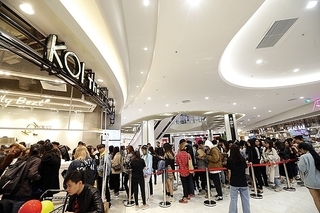Robust economic growth, rising incomes and retail sales increasing at the fastest rate in four years are making overseas retailers rush to set up outlets in Vietnam and expand quickly to tap the market.
 |
|
Vietnam’s retail sector has witnessed annual growth of 10% in recent years.
|
Miki House, a Japanese children’s clothing and product company, last week opened its first store in Vietnam at the Akuruhi Tower commercial center in Ho Chi Minh City’s District 1.
Phan Thanh Tan, Chairman of Akuruhi Group, which was chosen by Miki House as its exclusive distributor for the Vietnamese market, said if the first shop gains ground on the local market, the firm will soon open two more shops in Ho Chi Minh City and some others in Hanoi in the coming months.
Apart from Miki House, after launching its first store in Ho Chi Minh City in early December last year, which covers 3,000 square meters and is one of its biggest in Southeast Asia, Japanese global apparel retailer Uniqlo has announced its second store in Vietnam will be open in Hanoi on March 6 at Vincom Center in Hanoi’s Dong Da district.
Uniqlo said that it plans to expand its reach in the Vietnamese market this year by opening at least three stores in Hanoi and hitting the target of operating 20 Uniqlo stores nationwide.
Tadashi Yanai, chairman and CEO of Fast Retailing Co., Ltd, the parent company of Uniqlo, declared at the opening of the brand’s first store in Ho Chi Minh City that: “Vietnam is a land of promise.”
Besides fashion, retailers in other sectors have also sped up business in the Vietnamese market.
Aside from the first Matsumoto Kiyoshi pharmaceutical and cosmetics store set to open its doors in Ho Chi Minh City in late March this year, Ryohin Keikaku Co., Ltd, the company that runs the Muji chain of household goods stores, has announced that it will enter the Vietnamese market in 2020.
Korean supermarket giants such as Lotte Shopping and E-Mart already have a presence in Vietnam and also plan to expand its footing further this year.
Promising, but tough market
Vietnam, with its young demographic, growing incomes and large population, is considered a hugely promising market for retailers.
“With a population of nearly 100 million people, 60% of whom are under 35 years of age and 50% are middle class, Vietnam is a promising market,” Dinh Thi My Loan, chairwoman of the Association of Vietnam Retailers, said.
Besides, Loan said, the retail, service, and the food and beverage sector in Vietnam has witnessed annual growth of 10%. With the support of technology and the increase of M&A, the Vietnamese retail sector is looking at great prospects of positive change in the future.
Data from the Vietnam’s General Statistics Office also indicated that the Vietnamese economy grew 7.02% in 2019, with retail sales of goods and services rising 11.8% to reach VND4,940 trillion (US$214.8 billion).
Monthly income per capita, meanwhile, was estimated at US$182 in 2019, higher than the US$168 registered in 2018.
Figures like these are enticing for overseas retailers looking to expand into the Vietnamese markets. However, it is also making the competition in the market fiercer.
According to Nguyen Vu Duc, consumer industry leader at Deloitte Vietnam, though Vietnam’s retail sector holds immense potential for growth, the level of competition is intense.
“Across different retail formats, we are witnessing domestic and foreign retail giants engaged in a battle for dominance as they embark on aggressive expansion strategies,” he told the media.
Foreign retailers are facing a stiff challenge from Vietnamese businesses. For example, Vingroup and Masan Group have recently merged their retail and consumer goods manufacturing businesses to create the country’s largest retail company. Hanoitimes
Anh Hong

Vietnam retailers striving to mitigate COVID-19 implications
Feeling the bite of the ongoing coronavirus (COVID-19) outbreak, many businesses in retail and services are coming up with measures to soften the blow.

Japan’s retailers reaching out to Vietnam’s market
Japanese retailers are increasingly amplifying business activities in Vietnam as the country’s middle class expands amid market conditions in their home country slowing down.
 Vietnam, with its young demographic, growing incomes and large population, is considered a hugely promising market for retailers.
Vietnam, with its young demographic, growing incomes and large population, is considered a hugely promising market for retailers.